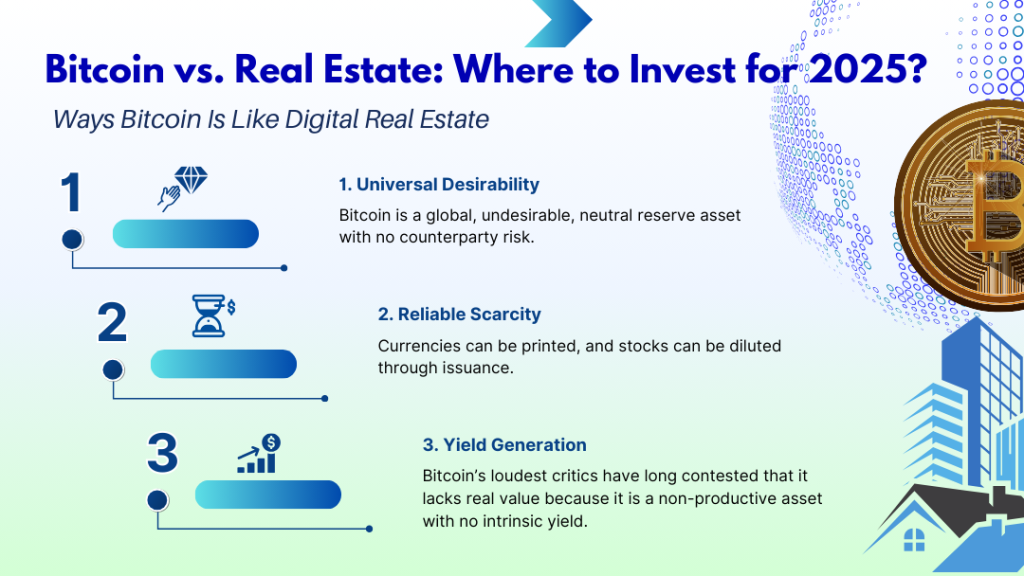
Bitcoin vs Real Estate Investment: How to Make the Right Decision
How much do you know about Bitcoin vs. Real Estate Investment 2025? Do you think it can disrupt the real estate market?
Over time, many things have evolved, especially in the ever-changing real estate market. The truth is that Bitcoin has established its own niche.
By 2025, Indian investors are evaluating whether to invest their money in Bitcoin or real estate. Both options have shown incremental growth, each with distinct features, risks, and potential rewards.
What are the trends? What can be expected from this currency in relation to property values? Continue reading to discover how investment behaviors might shift!
Bitcoin’s History
Bitcoin first appeared in 2009. Since then, it has experienced astronomical growth and wild price fluctuations. In 2017, Bitcoin started at around $1,200 and surged to approximately $16,800 by December.
This represents growth of approximately 1,300%. Such tremendous growth attracted numerous new investors who didn’t want to miss out on this cryptographic trend.
By 2020, Bitcoin began the year at approximately $6,000 and closed at around $22,800—an increase of roughly 280%. This trend continued in 2021, bringing Bitcoin’s price to an all-time high of around $564,000.
This demonstrates the impressive potential returns of cryptocurrencies. Bitcoin opened 2024 at $42,000, and by mid-year, it reached a peak of $62,400—a yield of approximately 48% annualized.
These positive trends have created many wealth-building stories for investors. For instance, Ravi Kumar, an early investor in Bitcoin, invested $960 in 2016 and grew his investment to approximately $120,000 by 2024.
Similarly, Sneha Patel invested $6,000 in 2021 when Bitcoin was priced at around $480,000. By mid-2024, her investment had grown to $78,000, yielding a 62.5% return.
Bitcoin in Real Estate: Trends for 2025
In the short term, as we enter 2025, Bitcoin is expected to remain extremely volatile. In October 2024, Bitcoin was priced at approximately $5,880.
Predictions suggest it could reach new heights, averaging $105,500 by the end of 2025, according to Bloomberg Intelligence.
Bitcoin offers an attractive hedge against inflation and economic uncertainty, which is a significant factor for many investors.
Institutional adoption is on the rise, with major corporations and financial institutions investing in Bitcoin, adding to its credibility as an investment option.
Governments are also building regulatory and organizational infrastructure around Bitcoin to facilitate proper transaction management. This could increase investor confidence, making Bitcoin a somewhat more stable and preferred investment.
The approval of Bitcoin ETFs will likely attract more institutional and retail investors. ETFs provide a regulated and simpler way to access Bitcoin and could increase market liquidity.
Additionally, with the circulating supply limited to 21 million, Bitcoin is increasingly perceived as a store of value akin to digital gold.
Real Estate Investment Trends for 2025

By 2025, real estate growth is expected to be moderate, with market expansion ranging between 0.5% and 4.4%. This growth is driven primarily by stable demand and limited housing inventory.
Smart homes and sustainable properties are in high demand. There’s also a trend toward suburban living due to the desire for more space, driven by remote work.
As a result, suburban real estate markets are expected to thrive, with more people seeking affordable housing away from urban centers.
Artificial intelligence is increasingly being integrated into property management, improving efficiency in predictive maintenance and tenant relations.
Blockchain technology is transforming real estate transactions, offering secure, transparent, and expedited property deals.
Smart contracts on blockchain minimize the need for third-party services and speed up real estate transactions.
How Should You Choose?
Ultimately, the choice depends on personal risk tolerance, investment goals, and financial circumstances.
For investors seeking high-risk, high-reward opportunities and who can handle market fluctuations, Bitcoin might be the better option.
For those prioritizing stability, tangible assets, and regular rental income, real estate could be the preferred choice.
Carefully consider these factors, conduct thorough research, and diversify your portfolio to balance potential risks and rewards effectively—whether investing in cryptocurrencies or real estate.
How to Take Advantage of Lead Generation?
The advantages of adopting technology in the real estate sector far outweigh the challenges. There are numerous benefits to be gained.
For example, Connekter provides real estate agents with tools such as email, telephone, and other forms of communication. Detailed reports on campaign performance enable continuous improvement through adjustments.
It supports a wide range of CRMs using Zapier and offers lead routing for integrations. All of this ensures enhanced security and greater opportunities for optimization.
The key is to keep growing. This approach helps businesses stay active, apply technologies, and modernize operations to remain competitive in an evolving market.
This is just a general overview of Bitcoin. However, if you are someone who favors real estate, these tools can be incredibly useful for your business.
If you want to learn how we can help you achieve better results, feel free to contact us. We are here to assist you!
Bitcoin vs. Real Estate Investment 2025: Best Crypto to Buy Now
1. Bitcoin (BTC)
- Market cap: $1.8 trillion
- Year-over-year return: 147%
Created in 2009 by Satoshi Nakamoto, Bitcoin (BTC) is the original cryptocurrency. Like most cryptocurrencies, BTC operates on a blockchain—a distributed ledger logging transactions across a network of thousands of computers. Because additions to this ledger require solving cryptographic puzzles (a process called proof of work), Bitcoin remains secure and resistant to fraud.
Bitcoin’s price has soared, becoming a household name. In May 2016, one Bitcoin was worth about $500. By November 19, 2024, it had surged to approximately $91,488—a staggering growth of 18,198%.
2. Ethereum (ETH)
- Market cap: $372.5 billion
- Year-over-year return: 53%
Ethereum, both a cryptocurrency and blockchain platform, is favored by developers for applications such as smart contracts (which execute automatically when conditions are met) and non-fungible tokens (NFTs).
Ethereum’s growth has been extraordinary. From April 2016, when it was priced at $11, to November 2024, it grew to approximately $3,093—an increase of 28,019%.
3. Tether (USDT)
- Market cap: $128.2 billion
- Year-over-year return: 0%
Unlike other cryptocurrencies, Tether (USDT) is a stablecoin backed by fiat currencies like the U.S. Dollar and Euro. Its value theoretically remains equal to these denominations, making it less volatile and a preferred choice for cautious investors.
4. Solana (SOL)
- Market cap: $113.6 billion
- Year-over-year return: 305%
Developed to power decentralized finance (DeFi), decentralized apps (DApps), and smart contracts, Solana uses a unique hybrid of proof-of-stake and proof-of-history mechanisms. Its native token, SOL, powers the platform.
SOL launched in 2020 at $0.77. By late November 2024, its price had risen to $239.28—a gain of 30,975%.
5. Binance Coin (BNB)
- Market cap: $88.5 billion
- Year-over-year return: 149%
Binance Coin (BNB) is a cryptocurrency that can be used to trade and pay fees on Binance, one of the largest crypto exchanges in the world. Since its launch in 2017, Binance Coin has expanded its utility beyond facilitating trades on Binance’s platform.
It is now used for trading, payment processing, and even booking travel arrangements. Additionally, it can be exchanged for other cryptocurrencies, such as Ethereum or Bitcoin.
BNB’s price in 2017 was just $0.10. By late November 2024, it had risen to approximately $614—a gain of 614,263%.
6. XRP (XRP)
- Market cap: $61.6 billion
- Year-over-year return: 75%
XRP, created by some of the founders of Ripple, is a digital currency designed to facilitate exchanges of different currency types on the Ripple network, including fiat currencies and other major cryptocurrencies.
At the beginning of 2017, XRP was priced at $0.006. By November 19, 2024, its value had risen to $1.08—a staggering increase of 17,947%.
7. Dogecoin (DOGE)
- Market cap: $57.3 billion
- Year-over-year return: 387%
Dogecoin was initially created as a joke in 2013 but quickly evolved into a popular cryptocurrency, thanks to its dedicated community and creative memes. Unlike many other cryptocurrencies, Dogecoin has no maximum supply, which makes it susceptible to devaluation as supply increases.
In 2017, Dogecoin was valued at $0.0002. By November 2024, it had risen to $0.39, reflecting an extraordinary growth of 195,071%.
8. U.S. Dollar Coin (USDC)
- Market cap: $37.3 billion
- Year-over-year return: 0%
USDC, like Tether, is a stablecoin backed by U.S. dollars. Its value is pegged to maintain a 1:1 ratio with the U.S. dollar. Powered by Ethereum, USDC can be used for global transactions with relative ease.
9. Cardano (ADA)
- Market cap: $25.5 billion
- Year-over-year return: 87%
Cardano (ADA) entered the cryptocurrency scene later than others but is known for its early adoption of proof-of-stake validation. This system increases transaction efficiency while reducing energy consumption compared to proof-of-work systems like Bitcoin.
Cardano supports smart contracts and decentralized applications, powered by its native coin, ADA.
In 2017, ADA was priced at $0.02. By November 19, 2024, it had increased to $0.73—a growth of 3,544%.
10. TRON (TRX)
- Market cap: $17.4 billion
- Year-over-year return: 94%
TRON is a blockchain platform designed for running smart contracts and other decentralized finance (DeFi) applications. Its native cryptocurrency, TRX, powers its proof-of-stake consensus algorithm.
TRON was founded in 2017, with TRX initially valued at $0.0019 per token. At its peak in 2018, TRX reached $0.2245—a remarkable gain of 11,715% in just a few months. As of November 2024, TRX is valued at approximately $0.20.
Bitcoin, Elon Musk, and Technological Disruption
Elon Musk, as a tech visionary and advocate for decentralized technologies, has indirectly bolstered Bitcoin’s prominence. Tesla’s early adoption of Bitcoin for transactions and its investment in cryptocurrency demonstrated Musk’s confidence in decentralized finance (DeFi).
Musk’s Influence on Bitcoin
Musk’s frequent endorsements of crypto projects, such as Dogecoin, have significantly influenced market trends. In a pro-business policy environment, Musk’s alignment with innovative technologies could further drive the adoption of cryptocurrencies.
Key Takeaway
In 2025, Bitcoin could gain increased institutional and governmental support, spearheaded by influential leaders in both the public and private sectors.
Real Estate and “New Lands” Under Trump’s Presidency
Speculation about new land developments and infrastructure projects under a Trump administration could present unique opportunities for real estate investors. Historically, Trump’s real estate background has informed policies favoring deregulation and development.
Potential Trends
Significant infrastructure projects or land developments could boost property values, particularly in suburban and rural areas, aligning with the growing demand for spacious and affordable housing.
Relating to Musk
Musk’s ventures, such as Tesla and SpaceX, have already driven property booms near their facilities. Similarly, speculative development in “new lands” could create opportunities in real estate near emerging technological hubs.
Investment Decision in Context
Investors must weigh Bitcoin’s volatility against the stability of real estate.
- Bitcoin: A high-risk, high-reward asset fueled by innovation and rapid market adoption.
- Real Estate: A stable investment with the potential for consistent returns and occasional booms tied to development policies.
Diversification is essential for balancing these trends effectively.
How to Choose the Best Cryptocurrency to Invest In
Bitcoin vs. Real Estate Investment 2025: When choosing the best cryptocurrency to invest in, it is important to consider your individual goals, investment timeline, and risk profile—just as you would with any other investment.
Additionally, you should perform thorough due diligence to ensure that any crypto project you are interested in is legitimate and secure.
In general, investors should consider the following factors when evaluating a cryptocurrency:
- Market capitalization: Indicates the size and stability of the cryptocurrency.
- Liquidity: Ensures ease of buying and selling.
- Security: Measures the robustness of the network and protocols against potential threats.
- Use case: Identifies real-world applications and adoption potential.
How to Invest in Cryptocurrency
You can buy cryptocurrencies through crypto exchanges such as Coinbase, Kraken, or Gemini. Additionally, some brokerages, including WeBull and Robinhood, also allow consumers to purchase cryptocurrencies.
How Much Does It Cost to Buy Cryptocurrency?
The cost of buying cryptocurrency depends on several factors, including the specific cryptocurrency you choose. Many smaller altcoins trade for a fraction of a cent, while a single Bitcoin can cost tens of thousands of dollars.
However, many brokerages and exchanges now offer fractional trading, enabling investors to purchase a portion of a cryptocurrency instead of a whole unit.
There are often additional costs and fees associated with having a crypto wallet and maintaining an account on a brokerage or crypto exchange. Be sure to understand all associated costs before making an investment.
How to Report Cryptocurrency on Taxes?
Bitcoin vs. Real Estate Investment 2025: If you buy and sell cryptocurrencies, it’s crucial to follow cryptocurrency tax rules.
Cryptocurrencies are treated as capital assets, similar to stocks, rather than as cash. This means that if you sell cryptocurrency at a profit, you will need to pay capital gains taxes.
This rule applies even if you use your cryptocurrency for purchases. If the value of your crypto at the time of use is greater than what you paid for it, you will owe taxes on the difference.
Which investment aligns with your goals? Let us guide you in 2025! See you at Connekter!
Extra resources:
- 3 Ways Bitcoin Is Like Digital Real Estate. Read more…
- Top 10 Cryptocurrencies Of October 15, 2024. Read more…
- Why Multifamily Real Estate Is The Best Investment For Financial Freedom?
- What to Expect From Bitcoin and Crypto Markets in 2024″: This article explores the key trends and expectations for Bitcoin and other cryptocurrencies, including the upcoming halving and its potential impact on the market. Read more here
Investopedia - “What’s Next for Bitcoin and Ether After the Recent Selloff?”: This piece examines the recent market volatility and offers insights into Bitcoin and Ether’s price movements, as well as their correlation with broader economic uncertainties. Check it out here Investopedia
.

